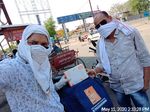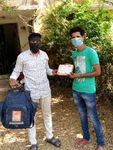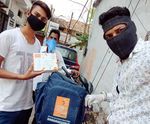Successful Pilot of e-Pharmacy Model Brings TB Treatment to Patients' Doorsteps
←
→
Page content transcription
If your browser does not render page correctly, please read the page content below
Successful Pilot of e-Pharmacy Model
Brings TB Treatment to Patients’ Doorsteps
Introduction
In December 2019, the Sustaining Health Outcomes through the Private Sector (SHOPS) Plus
project team in India, in partnership with the state government of Madhya Pradesh and the
pharmaceutical company Medlife International, launched an innovative, drug-to-doorstep e-
pharmacy model to help the fight against TB. The e-pharmacy model is innovative and the first
of its kind in India in that it provides doorstep delivery of anti-TB drugs and diagnostic services.
The pilot with Medlife is being rolled out in the cities of Jabalpur, Indore, and Bhopal with plans
to expand to additional cities in the state of Madhya Pradesh. SHOPS Plus, Medlife, and the
state government of Madhya Pradesh have worked together closely since the beginning of this
pilot to ensure that the e-pharmacy model fits the local context and has local government buy-in.
While the TB epidemic is declining in India, the country still has the largest number of TB
patients in the world, and half a million cases that go undiagnosed each year. A major barrier for
eliminating the epidemic is patients who do not fully adhere to the treatment regimen or who do
not complete the recommended treatment. One contributing factor to these failures to complete
their regimen by patients includes high travel costs to obtain treatment.
The government of India has pledged to provide free diagnoses and drugs for patients seeking
care in both public and private facilities, in part by referring private facility patients to the public
facilities. However, over 80 percent of early care seeking for TB occurs in the private sector, and
they are often deterred by the need for an additional trip to receive the free services. SHOPS
Plus is partnering with Medlife and the Madhya Pradesh government to reduce this barrier by
using technology to provide diagnosis and treatment support services to patients, through an e-
pharmacy model.
Implementing the e-pharmacy pilot
In the e-pharmacy model, private providers can
prescribe home sputum testing materials to
presumptive TB patients. The test is completed in the
comfort of the patient’s own home, and e-pharmacy
agents will pick up the materials and deliver them to
the lab facility. The lab uploads the results to Nikshay,
the government’s online platform, where providers
can view results and prescribe treatment. Once the
prescription is verified by the e-pharmacy, agents
deliver the drugs directly to the patient’s home—
typically within a week. The platform also features
communication technology to follow up with patients
to remind them to take their drugs as well as the due
date for the next delivery.
1After the treatment ends, the platform also prompts communication with the patient confirming
they have successfully completed their regimen.
The actions to combat the COVID-19 pandemic in India have created further obstacles for TB
patients who need to obtain their treatment medication and for patients who need to be tested
for TB. The related lockdowns, in which private medical providers closed or only functioned
partly, resulted in limited access to health providers for TB screenings, diagnoses, treatments,
and patient counseling. The e-pharmacy pilot has been invaluable during this time by securing
government exemptions to allow Medlife to continue delivering drugs to patients’ homes. Due to
the lack of access to providers during the pandemic, the pilot has also expanded to support
patients who use public providers to ensure that no TB patient is left out.
Figure 1. Key steps in the e-pharmacy model
Provider diagnoses E-pharmacy procures and Patient receives
patient and prescribes delivers medicines to treatment adherence
medicine patient's home support
• Presumptive TB patient consults • E-Pharmacy validates the • Medlife pushes reminders to
with provider for diagnosis test. prescription, creates order in the patient through a call
• Medlife collects sputum sample their system and alerts logistics. center at 10 days and 5 days
from patient and deliveres to • Logistics then collects before next refill to complete
RNTCP Lab. medicines from NTEP store and full treatment cycle.
• Nikshay is notified and patient packages them. • Patient follows up and reorders
is prescribed NTEP drugs by • E-Pharmacy sends SMS to medicines next month .
provider. patients and delivers the
• Prescription is uploaded via consignment to patient home.
WhatsApp by patient to e-
pharmacy.
• SHOPS Plus coordinator along
with clinic staff support patient
to register and upload
prescription, Linking patient to
direct benefit transfer when
applicable.
Results
The e-pharmacy model has provided sputum sample collection for nearly 600 patients (Figure
2) and delivered free TB drugs to over 2,800 patients at their doorstep in the three pilot cities
(Figure 3).
2Figure 2. Patients diagnosed with TB through sample collection services
700
600
Samples tested for TB
500
400 Samples of high enough
300 quality to determine result
Samples positive for TB
200
100
0
Figure 3. New patients enrolled in Medlife pilot to receive free TB drugs
600
565
500 500
400 376
300 307 315
200 100
77 133
22 116 133
100 71
0 33 64 53
20
0
1
0
0
20
0
20
20
20
21
20
0
21
20
-2
-2
t-2
l-2
r-2
-2
c-
g-
b-
p-
b-
n-
n-
v-
n-
ar
ar
ay
Ju
Oc
Ap
De
Au
No
Ju
Fe
Ja
Se
Fe
Ja
M
M
M
Figure 4. Outcomes of enrolled patients, January–August 2021
1.6%
9.2%
Completed
treatment / cured
Other (regimen
change, treatment
failure, etc.)
Lost to follow up
89.2%
3As COVID-related lockdowns began in March 2020, the pilot expanded to patients from public
facilities in June 2020, and city managers began driving the program in August 2020. Despite
these changes, loss to follow-up remained low at just 1.6 percent of patients over an eight-
month period (Figure 4). The pilot also linked nearly 2,600 patients with the government’s direct
benefit transfer scheme that provides free nutrition support to TB patients.
Lessons learned from the pilot
Enrollment
SHOPS Plus found it could increase efficiency by engaging doctors who already had a high
caseload of presumptive TB patients. This way the e-pharmacy could be presented as a way to
serve their clients better. The project also found that by providing a range of options to get
onboarded to the Medlife platform, they made enrollment easier and more likely to be completed
by patients. An example includes sending a scanned version of the prescription to the Medlife
WhatsApp number, or directly uploading to the Medlife platform. This ensured reduced provider
dependency while empowering the patient to be in direct touch with Medlife for onboarding and
consequently for any other issues that might arise later.
Government advocacy
Advocacy with the Madhya Pradesh government from the stage of conceptualizing the pilot was
crucial for local buy-in. Ensuring advocacy with the government early on allowed time for them
to overcome any negative perceptions of the private sector and their objectives. Similarly, it
allowed for appropriate time for the private sector vendor, Medlife, to convince the government
that the idea is commercially viable. Another advantage of engaging the government early on is
in the integration of the e-pharmacy pilot with government systems, for example data from
Medlife on the TB patients is integrated into government TB database (Nikshay) to ensure that
the government has a complete picture of all TB services and patients being rendered. The
project also worked with the government of India’s National TB Elimination Program (NTEP) to
add appropriate language in their partnership guidelines, which in turn provided an endorsement
and confidence to state government officials to engage with the e-pharmacy agency.
Engaging the government and the private sector
The contract with Medlife was the first of its kind. As a result, contract negotiations were lengthy
and demanded flexibility from all parties. The e-pharmacy request for indemnification from
potential legal action on account of shortcomings by the government or the treatment provider
needed to be addressed before they agreed to conduct the pilot. Ultimately, the parties built
trust through the shared vision of increased access to TB treatment for patients.
Doorstep delivery
TB is a highly stigmatized disease in India. Stigma can often lead to shame and makes patients
afraid to seek treatment, tell their family and friends, or follow through with treatment. The
doorstep delivery aspect of the e-pharmacy model allows patients to be tested and receive
treatment from the privacy of their own homes, thereby increasing the chances that they seek
testing and the likelihood that they complete treatment. This model also has potential to be
extended to drug delivery for other diseases that carry stigma for patients.
Flexibility
When the e-pharmacy model was first envisioned, no one could have foreseen the challenges
that lay ahead with national lockdowns and a global pandemic. The flexibility of both parties as
4the COVID-19 pandemic unfolded has shown the resilience of the model and benefits to be
gained when stakeholders are willing to adapt to changes in the initially envisioned outcome (for
example, expansion to the public sector).
Next steps
SHOPS Plus will fully transition the oversight of the e-pharmacy pilot to the Madhya Pradesh
government as stated by the State TB Officer at the World Conference on Lung Health. The
Madhya Pradesh government has so far appointed two patient provider support agents to
support effective delivery of TB interventions by engaging private providers.
At the city level, SHOPS Plus supported Medlife staff and
the district TB office through improved coordination of the
e-pharmacy pilot. This helped Medlife and the district TB
office more effectively troubleshoot issues in the e-
pharmacy process, organize TB drugs for delivery,
ensure patients’ data are uploaded on the NIKSHAY
website, and link TB patients with other eligible
government initiatives such as POSHAN direct benefit
transfer. SHOPS Plus capacity building also enabled the
project to smooth out (and document) implementation
challenges, thereby providing a fully tested proof of
concept in April 2021, which the Madhya Pradesh
government can use to inform the e-pharmacy scale-up.
The project will evaluate the proof of concept with
respect to its operational and cost efficiency and document the learnings.
The project has delivered free TB drugs to over 2,600 patients and is transferring the standard
operating procedures to the Madhya Pradesh government so that it can continue implementing
the model. At the state level, SHOPS Plus helped the Madhya Pradesh government accurately
budget the e-pharmacy costs in the program implementation plan, which was approved in
March 2021, to ensure adequate government funds are available to continue and scale up the
model. SHOPS Plus also equipped the state TB office with the skills to conduct the procurement
mechanism to contract an e-pharmacy vendor directly. The budget for implementing the e-
pharmacy in the program implementation plan was approved by the government in three cities
for FY2021–2022, and the budget has been released to the Madhya Pradesh National Health
Mission for Implementation.
Find Us SHOPSPlusProject.org
Sustaining Health Outcomes through the Private Sector (SHOPS) Plus is a five-year cooperative agreement (AID-OAA-A-15-
00067) funded by the United States Agency for International Development. The project strategically engages the private sector to
improve health outcomes in family planning, HIV, maternal and child health, and other health areas. Abt Associates implements
SHOPS Plus in collaboration with the American College of Nurse-Midwives, Avenir Health, Broad Branch Associates, Banyan
Global, Insight Health Advisors, Iris Group, Population Services International, and the William Davidson Institute at the University of
Michigan.
This brief is made possible by the support of the American people through the United States Agency for International Development.
The contents of the brief are the sole responsibility of Abt Associates and do not necessarily reflect the views of USAID or the
United States government.
5You can also read




















































